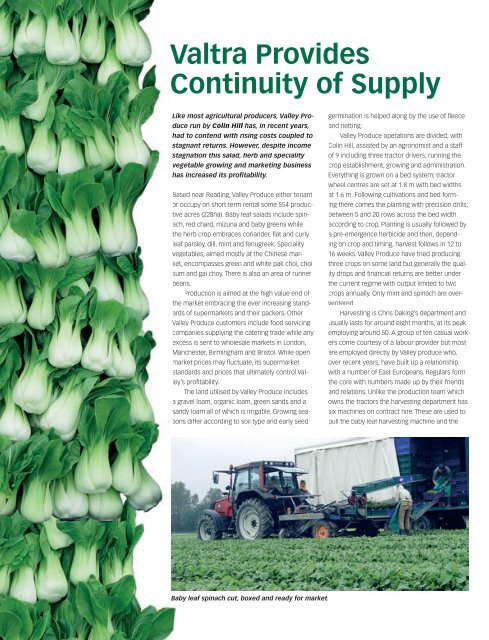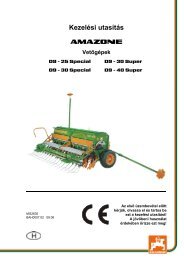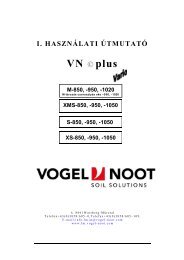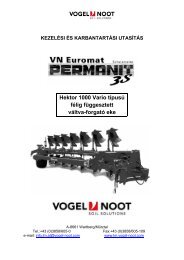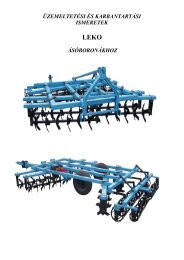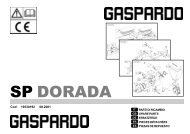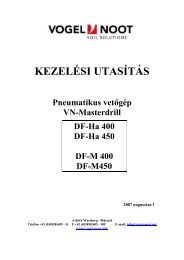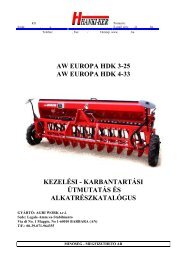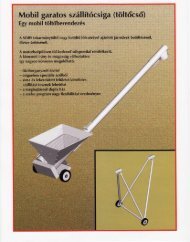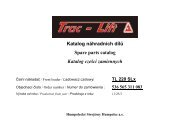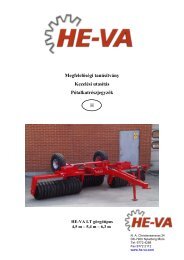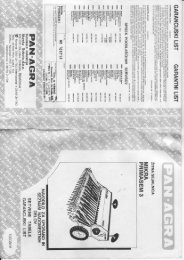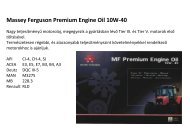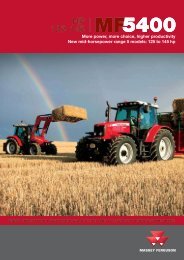Valtra - Hanki-Ker Kft.
Valtra - Hanki-Ker Kft.
Valtra - Hanki-Ker Kft.
- TAGS
- valtra
- www.hanki-ker.hu
You also want an ePaper? Increase the reach of your titles
YUMPU automatically turns print PDFs into web optimized ePapers that Google loves.
4<br />
<strong>Valtra</strong> Provides<br />
Continuity of Supply<br />
Like most agricultural producers, Valley Pro- Pro-<br />
duce run by Colin Hill has, in recent years,<br />
had to contend with rising costs coupled to<br />
stagnant returns. However, despite income<br />
stagnation this salad, herb and speciality<br />
vegetable growing and marketing business<br />
has increased its profi tability.<br />
Based near Reading, Valley Produce either tenant<br />
or occupy on short term rental some 554 produc-<br />
tive acres (228ha). Baby leaf salads include spin-<br />
ach, red chard, mizuna and baby greens while<br />
the herb crop embraces coriander, fl at and curly<br />
leaf parsley, dill, mint and fenugreek. Speciality<br />
vegetables, aimed mostly at the Chinese mar-<br />
ket, encompasses green and white pak choi, choi<br />
sum and gai choy. There is also an area of runner<br />
beans.<br />
Production is aimed at the high value end of<br />
the market embracing the ever increasing stand-<br />
ards of supermarkets and their packers. Other<br />
Valley Produce customers include food servicing<br />
companies supplying the catering trade while any<br />
excess is sent to wholesale markets in London,<br />
Manchester, Birmingham and Bristol. While open<br />
market prices may fl uctuate, its supermarket<br />
standards and prices that ultimately control Val-<br />
ley’s profi tability.<br />
The land utilised by Valley Produce includes<br />
a gravel loam, organic loam, green sands and a<br />
sandy loam all of which is irrigable. Growing sea-<br />
sons differ according to soil type and early seed<br />
Baby leaf spinach cut, boxed and ready for market.<br />
germination is helped along by the use of fl eece<br />
and netting.<br />
Valley Produce operations are divided, with<br />
Colin Hill, assisted by an agronomist and a staff<br />
of 9 including three tractor drivers, running the<br />
crop establishment, growing and administration.<br />
Everything is grown on a bed system; tractor<br />
wheel centres are set at 1.8 m with bed widths<br />
at 1.6 m. Following cultivations and bed form-<br />
ing there comes the planting with precision drills;<br />
between 5 and 20 rows across the bed width<br />
according to crop. Planting is usually followed by<br />
a pre-emergence herbicide and then, depend-<br />
ing on crop and timing, harvest follows in 12 to<br />
16 weeks. Valley Produce have tried producing<br />
three crops on some land but generally the qual-<br />
ity drops and fi nancial returns are better under<br />
the current regime with output limited to two<br />
crops annually. Only mint and spinach are over-<br />
wintered.<br />
Harvesting is Chris Daking’s department and<br />
usually lasts for around eight months, at its peak<br />
employing around 50. A group of ten casual work-<br />
ers come courtesy of a labour provider but most<br />
are employed directly by Valley produce who,<br />
over recent years, have built up a relationship<br />
with a number of East Europeans. Regulars form<br />
the core with numbers made up by their friends<br />
and relations. Unlike the production team which<br />
owns the tractors the harvesting department has<br />
six machines on contract hire. These are used to<br />
pull the baby leaf harvesting machine and the


